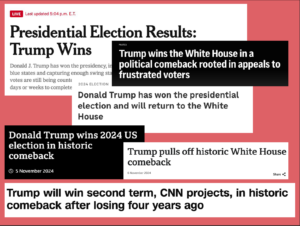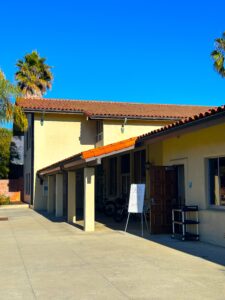In less than two weeks, the nation will be voting in the 60th United States presidential election. Although most SBHS students are too young to vote, 18-year-old seniors may be seriously considering registering to vote. The deadline for online or mail registration is October 21, while in person registration takes place through November 5. Election day is Tuesday, November 5 and students are allowed one excused absence per year for a civic or political event if they wish to use it to vote during school hours. However polling is open until 8 pm to make it more accessible.
So, who are we voting for? Running for the Republican party for the third time is Donald Trump and Ohio Senator JD Vance. Running for the Democratic party is current Vice President Kamala Harris and Minnesota Governor Tim Walz. There’s an array of hot button issues each team is campaigning on. One that is appearing most in the media is abortion rights. On June 24, 2022 the U.S. Supreme Court overturned Roe v. Wade, ending the constitutional right to an abortion that had been in place since 1973. This left the decision of reproductive rights to the states’ government, with right leaning states having more restrictions and bans, and left leaning states protecting access to reproductive care. For example, following Roe v. Wade being overturned, in November of 2022 California voters passed Proposition 1, which modified the Constitution of California to explicitly protect the right to an abortion. States where abortion is banned with no expection for rape or incest include Alabama, Arkansas, Kentucky, Louisiana, Missouri, Oklahoma, South Dakota, Tennessee, and Texas. Many other red states have varying degrees of restrictions, while in the 21 left-leaning or swing states abortion is protected by state law. Kamala Harris promises once re-elected she will get Congress to pass a national law codifying abortion rights, even stating she supports ending the filibuster (specific action designed to delay or prevent a vote on a bill, resolution, or amendment) in order to receive the 51 votes in the senate need to reinstate Roe v. Wade. “…we need to actually put back in law the protections for reproductive freedom and for the ability of every person and every woman to make decisions about their own body and not have their government tell them what to do,” quotes Harris to “The Morning Show.” Donald Trump is more vague on the issue, saying he would not enact a nationwide ban immediately but continue to leave the decision up to the states. Most anti-abortion advocates view Trump as a definite ‘pro-life’ president due to his appointment of the three supreme court justices that were integral to ending Roe v. Wade in the first place. It’s up to American voters to decide whether abortion rights should be available or restricted.
Another big issue heavily discussed in this election cycle is immigration. Both candidates advocate for a strong border and tougher immigration laws, however Harris still remains the more moderate of the two. Harris supports an earned pathway to citizenship for immigrants, has been vocal against the separation of migrant families in the past, and wants to pass the border compromise law that closes loopholes in the asylum process and grants the president more power over border control. Trump has a more extreme approach to the issue, promising to carry out the “largest domestic deportation operation in American history.” This would include deporting 11 million migrants deemed illegal in a military campaign spanning years. Trump also is pushing to end birthright citizenship, which means denying children born in the US by undocumented parents immediate legal citizenship. Once again voters in November will vote on what method they deem best for this issue.
Should any of this matter to students? Teachers at SBHS sure think so. AP US History teacher Kristin Hempy commented on the importance of students being informed about politics saying, “High school is a really good time to start paying attention because even if you can’t vote in this election, most likely you’ll be able to vote in the next one. The more the younger generations can get involved, the more change you can have in your future.” History teacher John Gannon adds, “the decisions that politicians make not only affect adults, but they affect students that are in high school and minors as well. I think it’s really important that they stay informed about what’s going on in the political system.” World History and debate teacher John Tormey agreed on the importance, but added, “it’s hard for students to be truly informed because there’s so much misinformation, so it’s quite the task for people to truly understand what’s going on.” In less than two weeks, Americans will get their answer to where this country is headed, and it will be in our best interests to pay attention this time around.
People display their opinion as the election draws near. [Image Credit: Clara Watson]






Be First to Comment